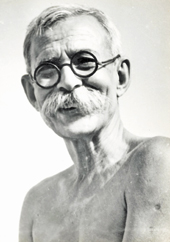 |
 |
| Dadathakur and a journal edited by him |
The electronic media has recently been in the news for all the wrong reasons, so it seems especially apt to recall the colourful and contrary life of Saratchandra Pandit aka Dadathakur, who practised radical media at a time when the modern Indian press was still taking baby steps. A one-man wisecracking whirlwind against corruption, obscurantism and plain stupidity, Dadathakur’s brand of guerrilla journalism remains an abiding object of curiosity in the world of Bengali letters.
Born in Birbhum in 1881, the wretchedly poor Saratchandra struggled to pay for school, and was only able to do so by performing astonishing feats of memory and versification. According to his biographer Nalinikanta Sarkar, on one occasion the boy Sarat was able to save his free studentship by learning overnight the punctuation of all the poems in his curriculum (this was at a time when everything had to be committed to memory). He did this by writing a song about punctuation, as a mnemonic device. This facility with versification was to stand him in remarkably good stead in his later life.
After being forced to drop out of Bardhaman’s famed Raj College, the young Sarat decided to go gonzo. Like a journeyman printer from the 16th century, he bought a wooden hand-press and became a one-man printing shop. Unable to afford cases for the type, he stored the lead in earthen pots. He combined the roles of author, compositor, proof-reader, machine-man and hawker in his own person, and began to publish a weekly called the Jungipore Sangbad. The periodical gave offence without fear or favour, taking on corrupt government officials, insolent jacks-in-office and hypocritical do-gooders. There was also another periodical called Bidushak (The Jester), which was even more in-your-face and subversive.
But Dadathakur was nobody’s fool. He was fiercely independent and upright, treating high and low alike, and going everywhere in his homespun dhoti and chadar. His run-ins with authority and nobility were reminiscent of another kindred spirit, Ishwarchandra Vidyasagar. But what set Dadathakur apart from Vidyasagar was his instinctive sense of theatre and performance. In order to launch a new periodical called Botol puran (Chronicles of the bottle), Dadathakur danced and sang in the streets of Calcutta. He composed poems on the run, not just in Bengali, but also in Hindi and English, and sometimes in a combination of all three languages.
His chief stock-in-trade was the multilingual pun, a much-maligned art form to which he restored a certain degree of respectability. It is impossible to provide samples of his poetry here, but those interested might look out for such philippics as “Bonedi haramjada” and “Samajnetar value = zero”.
Dadathakur also had the singular experience of seeing a biopic being made in his lifetime (he died in 1968), with Chhabi Biswas playing the title role.











